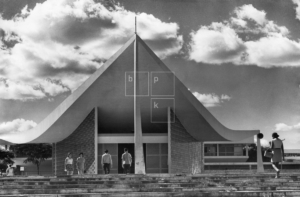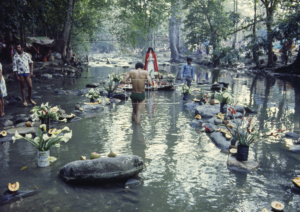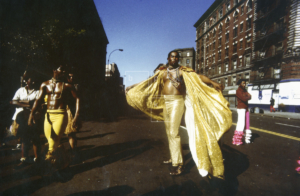The Work
Rubrics and Categories
The photographic estate of Leonore Mau is marked by its universal compass. Nonetheless, one can determine a number of recurrent motifs and thematic clusters that have been grouped in the following overarching categories: Architecture, Urban Life, People and Rituals.
Besides her architectural photographs for specialist journals and magazines, the estate also includes photographs of churches, gardens and social housing. In addition, numerous images document poverty-stricken districts such as the favelas in Brazil or the bidonvilles on the outskirts of Paris, all of which are filed here in the category Precarious Relationships. Beyond this, there are also shots of colonial architecture such as that found in the Caribbean. Mau’s gaze was directed not only at edifices in their totality but also at details, as evidenced in her numerous close-ups of house façades, graffiti, murals or lettering, signs and commercial posters, which are collected in their own rubric titled Projects and Themes.
Equally striking are Mau’s photographs that have been classed under the heading Urban Life: markets, harbours, beach settings, cemeteries and street scenes which repeatedly feature shop window mannequins and reflective surfaces. Particularly worthy of attention are her milieu studies, such as those of the Jewish community in Miami or of Black people in Paris.
The rubric People offers not only portrait photographs of public figures, among which are also the shots of Hubert Fichte, her life companion and colleague, but also pictures of children and people from all over the world. Subjects of particular interest to the photographer were, among others, homeless people, amorous couples, nuns, tourists, shoe-shiners, newspaper sellers and other people busy photographing.
There is a special section devoted to rituals and ceremonies, which include African and African-American rites, traditional healing ceremonies in Brazil, the Caribbean, the US, Venezuela and West Africa, as well as the annual carnival processions in, among other places, Haiti, Trinidad and New York.
Assembled in a further category of its own are the images that Mau made in the context of her and Hubert Fichte’s research into the “psychiatric villages” in Senegal, many of which were published in the photo book Psyche.
Among her final photographs are pictures that Leonore Mau took in Wuppertal in the 1990s and her series Fata Morgana, which was produced in around 2004.
Leonore Mau photographed from the mid-1950s until the mid-2000s.
Untitled (Chapel of Our Lady of Fatima), 1969
© bpk / S. Fischer Stiftung / Leonore Mau
Untitled (A statue of the goddess Maria Lionza in Sorte), 1977
© bpk / S. Fischer Stiftung / Leonore Mau
Untitled (Man in the golden costume), 1979
© bpk / S. Fischer Stiftung / Leonore Mau





